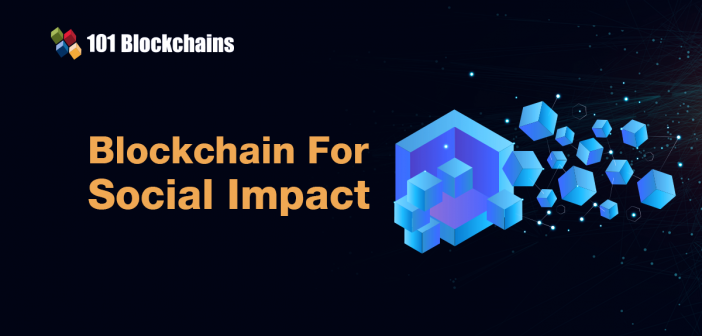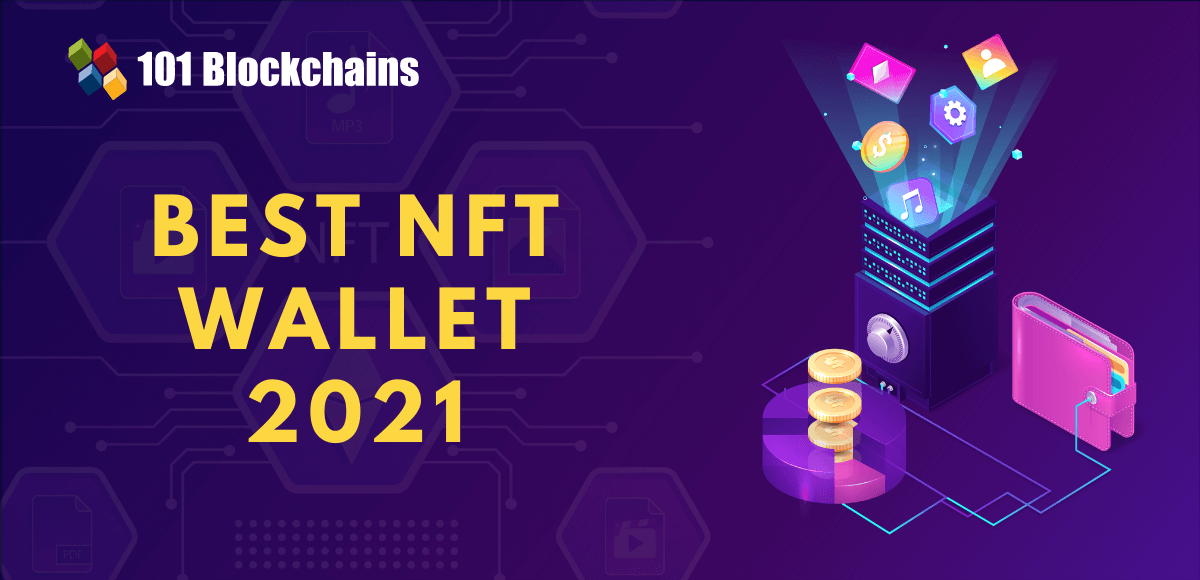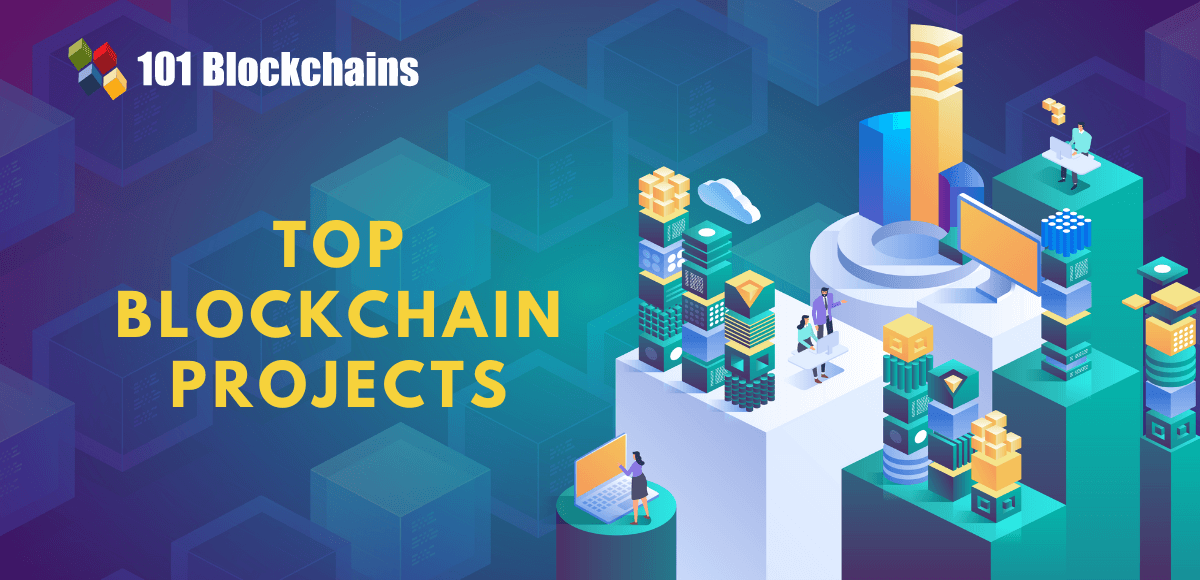Learn how blockchain truly works, master key definitions, and uncover what makes smart contracts so "smart." Dive into the fundamentals, gain valuable insights, and start your blockchain journey today!

Reviews
101 Blockchains
on March 09, 2020
Blockchain For Social Impact in 2020
Blockchain has the ability to change everything around us. The topic of the article that we are going to discuss is the blockchain for social impact. Here, we will explore how exactly blockchain is changing the social impact projects.
Blockchain has recently garnered a lot of attention from industry experts, professionals and the general audience. The reason is how it helps eradicate the problems that most of the industries are going through. If you check blockchain use-cases, you will find that blockchain’s biggest impact is the financial sector, followed by supply chain, real estate, healthcare and so on.
However, one area that is also being majorly impacted is social projects. If we take blockchain and social impact together, we will be able to find a clear relationship between them. The article’s aim is to understand the relationship and impact of blockchain on social. This also means that we discuss the social impact of blockchain.
Build your identity as a certified blockchain expert with 101 Blockchains’ Blockchain Certifications designed to provide enhanced career prospects.
Blockchain For Social Impact
Please include attribution to staging2.staging2.101blockchains.com with this graphic. <a href='https://staging2.staging2.101blockchains.com/blockchain-infographics/'> <img src='https://staging2.staging2.101blockchains.com/wp-content/uploads/2020/03/Blockchain-for-social-Impact.png' alt='Blockchain for social Impact='0' /> </a>
Let’s get started.
What is blockchain?
It is essential to learn blockchain technology to get a better understanding of the social impact of blockchain.
Blockchain is a type of distributed ledger technology(DLT) where peers connect to form a network and function without the need for a centralized entity. Each peer has its own ledger and participates in different activities, including validating transactions using consensus methods.
Bitcoin blockchain is a great example. Here each peer has its own ledger and utilizes Proof-of-Work(PoW).
Some of the key features that are offered by blockchain include transparency, traceability, security, immutability, and trust.
Wish to learn more, then check out the Blockchain guide. Want to learn about the features, then check out the key features of the detailed blockchain tutorial.
Players in Blockchain for Social Impact
With our basic understanding of blockchain established, it is now time to jump into the players in blockchain for social impact. What’s better than looking at the players who are trying to revolutionize social work with their projects? Below are some of the blockchain social impact projects. Let’s get started.
Blockchain for Social Impact Coalition(BSIC)
Blockchain for Social Impact Coalition is a non-profit organization that helps blockchain solutions tuned for environmental and social challenges. It works in the United Nation’s Sustainable Development Goals. It helps them to incubate, collaborate, and develop the project. They aim to improve the connectivity between government agencies, NGOs, investors, philanthropists, and other key players.
Currently, it is focusing on sectors including supply chain, environment & energy, financial inclusion, human rights, education, and health & wellness. It also has many members, including “Chooose,” eduDAO, Everex, Tata Consultancy Services, WWF, and so on!
Consensus blockchain for social impact and NGOs
Consensus blockchain for social impact, and NGOs is managed by Consensys. Their focus is to make the world a better place by providing the right set of effort to improve the success of projects dealing with environmental and social challenges. They are utilizing the help of the Ethereum community to help social entrepreneurs, NGOs, and investors. The goal is to reach global sustainable development goals. They focus on the following.
- Partnerships
- Education
- Supply Chain and Immutable Evidence
- Identity and Accessibility
- Cash Assistance and Philanthropy
- Social Impact Assets
They have amazing mesh contributors who make the project a reality. They include Alex Kostura, Silvana Rodriguez, Vanessa Grellet, and others. Their partners include Maker, RTI Humans Rights Foundations and others.
Dream to become a certified blockchain security expert? Enroll Now: Certified Blockchain Security Expert (CBSE)
Accenture blockchain for social impact
Accenture is also upfront when it comes to blockchain for social impact. Their initiative is to provide social impact through blockchain technology. To help improve their chances at social projects and collaborate with governments, NGOs, and enterprises for a better and sustainable world.
These organizations also do regular blockchain for social impact conference. So, if you want to know more, then follow their conference pages!
Blockchain Role In Social impact Initiatives
Awesome! We listed three of the players in blockchain for social impact initiatives. All these are quite big players and do have a significant impact. However, we still do not have a clear idea of how blockchain improves social impact initiatives. In this section, we will do just that and learn blockchain’s role.
Fraud and Risk reduction
One of the biggest advantages of blockchain for social impact is the reduction of frauds and risks associated with the project itself. Corruption is a huge problem, especially at the government level. This means that greedy people use the money aimed to provide relief to the needy. This is made possible because of the use of traditional solutions that are not transparent enough to solve corruption.
The best way to solve all these problems is by using blockchain. Blockchain offers a complete tamper-proof solution where each transaction is verified using consensus methods. There is no dependency on a centralized authority and hence is free from any kind of fraud. The information stored in the blockchain is also immutable, which means that once stored, it cannot be modified or changed by a malicious actor. For NGOs, this means that donations can no longer be manipulated.
Reduced Administrative Costs
Charities require a lot of work to manage properly. That means spending a lot of money needs to be spent on administrative costs. With blockchain, these administrative costs can be reduced. With smart contracts, it is now possible to manage financial and legal intermediaries. Automation is always helpful and hence makes it easy for everything to deal with aspects that are monotonous or non-creative.
Curious to understand the complete smart contract development lifecycle? Enroll in Smart Contracts Development Course Now!
Accountability and Transparency
By using blockchain, it is now possible for charities to be accountable and transparent. It is a known fact that people are always skeptical of charities. But, with blockchain, donors can be sure of what they are doing. They can see how their contributions are making a difference.
Faster border transfers
Traditional banking channels are not good when it comes to transferring money internationally. It can take anywhere between days to send money. On top of that, there is also a cost associated with the transfer. As most charities are global, they are in constant need to do international transactions. The late reach can hamper their efforts.
By using blockchain, they can make use of digital currencies, which can be transferred using a network without a centralized authority. With it, they do not have to pay the intermediaries and also do not have to wait too long for the transactions to get completed.
Improved accessibility
With blockchain, it will now be possible for anyone to transfer or receive value. They do not have to depend on banking to be able to do all of these. This is a boom for charities and NGOs that are trying to help people from all backgrounds. By making this approach, the charities also do not have to do double-transfer and reduce both settlement and cost times.
Start your blockchain journey Now with the Enterprise Blockchains Fundamentals
Social sectors that are impacted using blockchain
In this section, we are going to go through the different sectors that are being impacted by blockchain from a social point of view. The statistics shared in the section are taken from the Standard Blockchain for Social Impact study.
Agriculture
Agriculture is one of those sectors that require careful attention. It has the ability to impact a huge population across the world. The main focus is to improve three key aspects of the supply chain in agriculture. This includes improving transparency, traceability, and efficiency. It will make sure that farmers are well connected to the consumers.
Some of the key highlights that are shared in the study include the following
- New initiatives are less than two years old.
- None of the new initiatives have more than 1000 beneficiaries
- Some of the initiatives have the ability to reach a million beneficiaries
- Most of the applications are for-profit
With blockchain, these problems can be solved. First of all, it can reduce contamination and food fraud. This can happen with the help of blockchain efficiency and transparency. The role of blockchain is to improve the third party involvement by ensuring that they are tracking, collecting and managing data in the best possible way. With blockchain, farmers and distributors are going to get their payments faster than ever-improving their ability to work on their next set of projects faster.
Projects: AgriDigital, Grassroots Cooperative, Bext360
Democracy and Governance
The next sector where blockchain can play a crucial role is Democracy and Governance. Right now, governments are very receptive to blockchain and its role in improving democracy and governance.
Key highlights
- Governments started blockchain as early as 2008
- 21 initiatives across Democracy and Governance.
- 81% of the initiatives have seen success by early 2019.
- Less than 50% of the initiatives are for-profit.
Governments run on trust. And, that’s where blockchain comes into play. With blockchain, governments can address security-related to the address data exchange. In addition, it will also allow users to vote via blockchain, which makes them instantly countable and traceable.
By using blockchain, the government can also store citizens’ data in a much better way. The data is immutable, which means that there is no citizen data that can be illegally deleted or edited. It also gives agencies the ability to access the data whenever they want. The lack of centralization also means that there is no central point of failure. The government can also run proper crowdfunding using blockchain.
Projects: e-Estonia, Votem
Energy, Climate and Environment
Blockchain technology has the potential to change the climate, energy, and environment. With millions of dollars of transactions, it is important to optimize every single aspect of this sector. Blockchain can help improve with the use of peer-to-peer transmission, and also gives the people the ability to create micro-grid.
Key highlights
- Only 10% of the initiatives are not for profit in the energy sector.
With the help of blockchain, the energy sector can bring in more efficient solutions. This also means that electricity can become more reliable, clean and affordable.
Projects: Grid Singularity, ME SOLshare
Want to know how to build your career in enterprise blockchains? Enroll in How to Build Your Career in Enterprise Blockchains course now!
Health
The health sector is one of those sectors that have tons of initiatives by both for-profit and non-profit organizations. With blockchain, healthcare can improve digital healthcare records. It also improves pharmaceutical supply chain management. As usual, blockchain offers a decentralized, efficient and secure solution.
Key highlights
- Healthcare initiatives have the highest impact in any sector.
- Only 18% of the initiatives are non-profit.
The key benefits include proper electronic health records, better privacy implementation and counterfeit drugs.
Projects: Modium.io
Philanthropy and Aid
Social impact can be best seen from the philanthropy and aid sector. Right now, the aid and philanthropy don’t reach their intended use. This is because of the huge inefficiencies that the current platform suffers when it comes to aid and philanthropy. Even with so much investment, there is still a need for additional funds to meet the demand for basic human rights, poverty and access to education.
Key highlights
- More than 80% of the initiatives are non-profit
- Over 55% of the initiatives are reaching less than 1000 people.
Billions of dollars are invested in helping the needy. However, these aids are mostly misused due to a lack of transparency. In fact, most of the aid never reaches the intended people. This has also led people to not contribute to these non-profit organizations. Blockchain can solve all of these problems and help elevate the confidence in non-profit in utilizing the funds.
Projects: Ixo Foundation, Disberse, RootProject
Start learning Blockchain with World’s first Blockchain Career Paths with quality resources tailored by industry experts Now!
Conclusion
This leads us to the end of our blockchain for social impact articles.
Curious to know more about blockchain and related technologies? Enroll now for blockchain certification and courses.
*Disclaimer: The article should not be taken as, and is not intended to provide any investment advice. Claims made in this article do not constitute investment advice and should not be taken as such. 101 Blockchains shall not be responsible for any loss sustained by any person who relies on this article. Do your own research!







